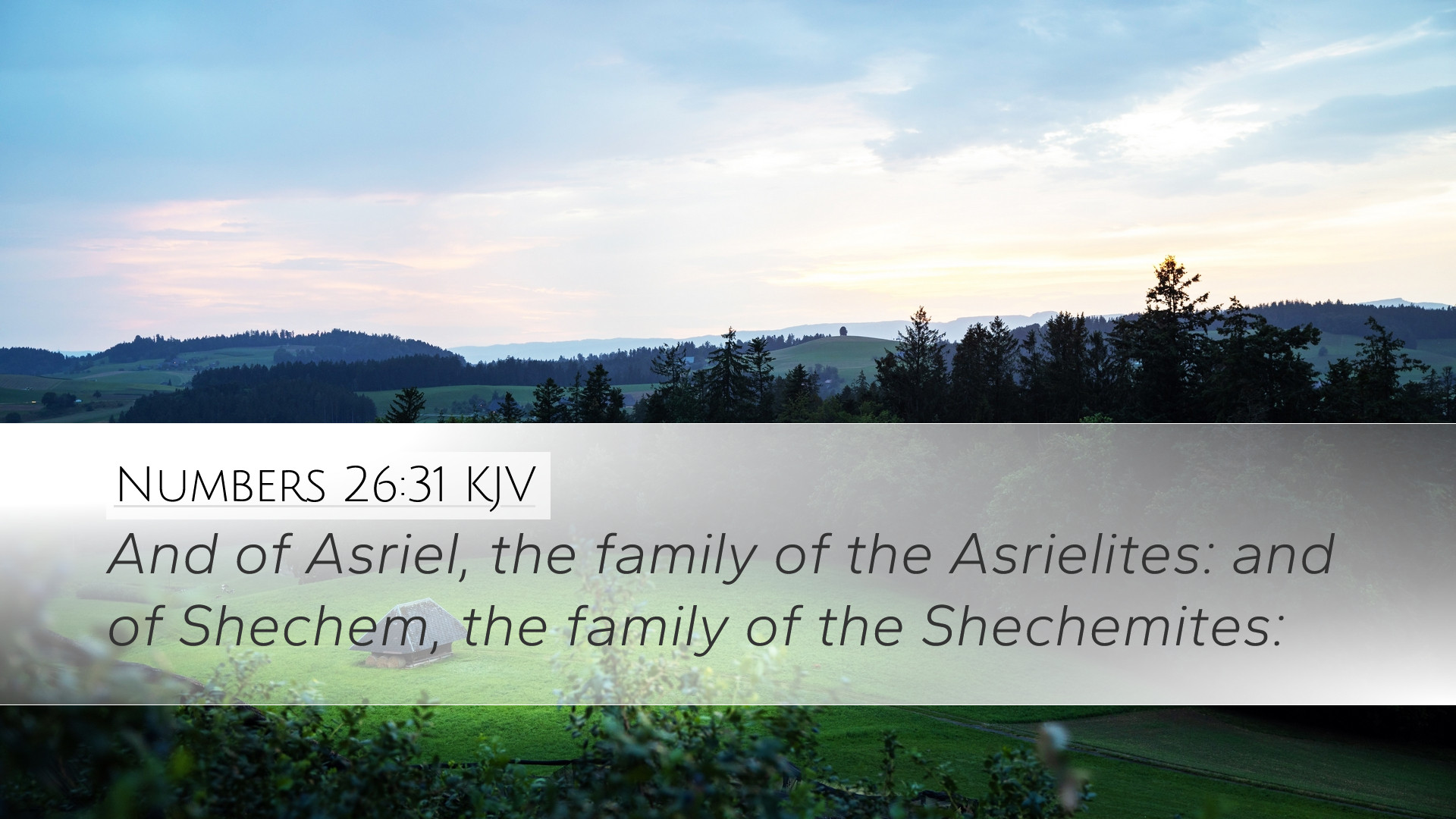Commentary on Numbers 26:31
Verse Text: "And the sons of Gad after their families: of Zephon, the family of the Zephonites: of Haggi, the family of the Haggites: of Shuni, the family of the Shunites:" (Numbers 26:31)
Exegesis and Context
The Book of Numbers is a critical ledger of Israel’s wilderness experience, chronicling their journey toward the Promised Land. Chapter 26 serves as a pivotal moment where God commands Moses to take a census of the Israelites, highlighting their families and tribal affiliations.
Numbers 26:31 points specifically to the tribe of Gad, distinguishing the key families within it. This verse exemplifies the genealogical importance in Israelite culture, revealing lineage and the fulfillment of God's promises to each tribe. The census signifies continuity and divine faithfulness across generations.
Insights from Matthew Henry
Matthew Henry emphasizes that the census not only addresses numerical strength but also delineates the unique identities of each sub-family within the tribes. For him, the names mentioned symbolize divine providence in allocation and inheritance. He asserts that God’s meticulous record of families opens our understanding to His sovereign care over His people.
Henry also points out that this ordering according to families underlines the communal and familial aspect of Israelite identity. Each family has a role in the larger narrative of the Israelites, demonstrating that individual families contribute to the collective purpose God has for His people.
Albert Barnes' Perspective
Albert Barnes expounds on the significance of the families listed as indicative of the broader genealogical structure in the Israelite community. He explains that each family name symbolizes the historical narratives and struggles they faced during their time in the wilderness. The families of Zephon, Haggi, and Shuni may represent distinct characteristics and contributions to the history of Israel, thus serving as reminders of their unique experiences and God’s providence over them.
Moreover, Barnes views the census as a reminder of accountability, as these family structures were crucial when it came to land allocation in Canaan. This systematic approach exemplifies God's righteousness as He establishes order among His people.
Contributions from Adam Clarke
Adam Clarke highlights the importance of the tribe of Gad's division, noting that each family had its distinct role and influence within the greater community. Clarke elaborates on the meaning behind names, suggesting that they provided the Israelites with a deeper understanding of their history and legacy.
In Clarke's view, Gad's families were also significant for their military prowess. He underlines that these familial units were not only crucial for societal structure but also prepared for the coming battles. The enumeration of families prepares the Israelites not only for settlement but also for their identity as warriors in the land God had promised them.
Theological Implications
- Divine Sovereignty: The careful documentation of families highlights God's sovereignty and control over Israel’s destiny.
- Community Identity: Numbers 26:31 illustrates the importance of community and lineage. It reminds leaders and congregations today of the value of recognizing and honoring family structures and histories within the church.
- Preparation for Purpose: In preparing them for battles as well as for inheriting the land, this census serves a dual purpose—uncovers their history and establishes a future-direction, illustrating that understanding the past is essential for successful navigation of the future.
Practical Applications
For pastors and leaders, Numbers 26:31 encourages an understanding of community dynamics in the church. Recognizing congregants' backgrounds, family histories, and unique contributions can enhance unity and purpose.
The emphasis on families within the tribe of Gad serves as a reminder to appreciate diversity within unity. Each member brings unique gifts that contribute to the body. The church should reflect this intricate tapestry of family stories, recognizing how each history informs the mission for God's kingdom work.
Conclusion
Numbers 26:31 stands as a testament to God's sovereign hand guiding His people through history. The genealogies found within this passage serve practical and prophetic purposes. The insights provided by Matthew Henry, Albert Barnes, and Adam Clarke enrich our understanding of these families not merely as names in a census but as integral components of a divine narrative of redemption and purpose.
In the end, this verse beckons us to consider our own places within our families and communities and to seek how we, too, can contribute to the overarching story of salvation that God is orchestrating in the present age.


